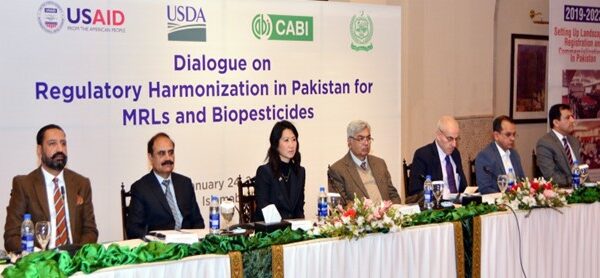
Potato is a major crop in Pakistan with the potential to grow in an expanding market
CABI in Pakistan, under its ACIAR-funded ‘Strengthening Vegetable Value Chain in Pakistan’ (SVVCP) project, is committed to improving the value chain of vegetables for smallholder farmers so they can improve their livelihoods. Dr Babar E. Bajwa, Project Leader, reports on the progress being made so far…
Potato is a major crop in Pakistan with great potential to grow. It presents both the prospect of revenue increase for producers as well as opportunities as a source of foreign reserve by increasing exports. Importantly, Pakistan’s potato industry is self-sufficient to supply for the needs of domestic household consumption.
The primary issue of potato growers is the availability of healthy and certified seed. Yields in the Punjab province of Pakistan is approximately 20t/ha, which is comparable China. But this is well below yields in Europe, North America and Australia – all having yields of more than 40t/ha. Inputs and diseases/pests constrain production; scab, late blight and nematodes are also significant production-related issues for potato production. Storage is also a major issue. The main autumn potato harvest occurs from January to March. The bulk of the crop is stored and then sold from June onwards. Poor handling, storage and transport systems result in estimated postharvest losses of 20-25%.
In Pakistan, the marketing system is dominated by middlemen targeting smallholders, who traditionally rely on them to finance production inputs. Close relationships between large farmers and large commission agents are used to control supplies to the market but this is a disadvantage to smallholders. Price volatility is an issue of on-going community concern for consumers as well as for farmers. The consistency of availability of fresh potatoes to the consumers and the industry at competitive price are areas where interventions need a better plan so that the farmers can get a better price. Understanding of consumers’ needs and demands is particularly important to decide potential interventions for application in target communities.

‘The understanding of consumers’ needs and demands is particularly important’
Small-scale farmers are not capacitated to manage their potato farms through the adoption of good agriculture practices, which include pest management, soil fertility improvement, post-harvest management, packaging and marketing of their produce. Crop rotation with maize is also a common practice among potato farmers in Punjab, where most potatoes are produced. This rotation works as an ‘insurance policy’ for the farmers as, if one crop fails, the other covers the losses and enhances profitability.
There are seven layers of potato value chain which includes Growers, Value Addition and Processing, Traders, Retailers – End of Chain Suppliers to Consumers, Exporters, Input Providers and sector support service providers. Each actor plays a vital role to operate and improve potato value chains.

‘There are seven layers of the potato value chain’
To enhance the competitiveness of value chain, it is necessary to improve the efficiency of each actor through research, capacity building programme and innovative technologies.
Potential interventions to improve Potato Value Chain in Pakistan include:
- Formation of small farmers groups to perform efficient farm business activities collectively by adopting a participatory approach.
- Production area: access to disease-free planting material, evaluation of varieties against frost, varietal selection for processing industry from indigenous germplasm, improved nutritional and cultural practices, management of disorders and diseases/pests.
- Postharvest: identification of critical control points to reduce losses and improve quality and shelf life, develop quality and grading standards, studies on maturity, field curing/storage techniques, dry field storage for small holders, evaluation of storage life of commercial varieties, control of sprouting, and development of code of practices.
- Value addition: farmers identification for variety, semi-processed chips or French fries in frozen form, potato powder, boiling/blanching, mashing, drying (tunnel/solar), potato powder biscuit, appropriate amount of potato powder with wheat flour, the potential for freezing.
Additional information
See project page ‘Strengthening vegetable value chains in Pakistan’
Also see the news story ‘Project launched to strengthen vegetable value chains in Pakistan’
Related News & Blogs
Sindh farmer gains global recognition for sustainable cotton farming innovations
Photo credit: Evronas/Better Cotton. Location: Better Cotton Conference, Istanbul, Türkiye, 2024. Sindh farmer Fateh Muhammad Laghari has gained recognition for his commitment to sustainable cotton farming practices as part of the Better Cotton Member…
5 December 2024




